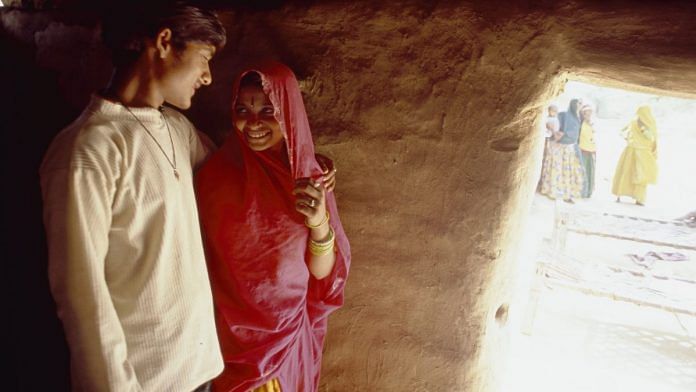Suggestions by NHRC are part of efforts to eliminate child marriage. Rights watchdog also wants free education up to 18 years of age.
New Delhi: The marriageable age for both women and men should be uniform in India, the National Human Rights Commission (NHRC) has recommended to the government but has stopped short of specifying what that age should be.
The legal marriageable age in India is 18 for women and 21 for men.
The suggestion was part of recommendations, made last week, that the NHRC wants different ministries to absorb in the efforts to eliminate child marriage.
The rights watchdog wants the Union Women and Child Development (WCD) Ministry and the Law Ministry to consider the uniform age for marriage, in line with similar practice in over 125 countries in the world.
Also read: It’s 2018, and Haryana is still swapping the girl child for marriage
The recommendations are based on two days of deliberations in August that the NHRC held with all stakeholders, including 10 state governments, on how to eliminate child marriage.
Other recommendations include measures such as making marriages below 16 years “void” and making free education mandatory for children up to the age of 18 years.
“There is a need to have a relook at our policy related to marriageable age in line with the modern context,” said Ambuj Sharma, secretary general, NHRC. “This will not only help remove the dichotomy in law where an 18-year-old man marrying an 18-year-old woman is treated as a criminal but will also go a long way in bettering the education prospects of women and empowering them further.”
The Law Commission had also recently recommended that the legal age for marriage for both sexes, cutting across religion, should be fixed at 18 years, the universal age of majority.
Jayna Kothari, executive director, Centre for Law and Policy Research, however, said that there was no logic in also fixing 18 as the marriageable age for men.
“The social norms when these rules were framed for the first time in the 1920’s, was to marry off girls at a young age,” Kothari said. “The anecdotal logic for fixing 18 as the marriage age for women and 21 for men was that girls reach puberty early and so mature fast as compared to boys. Also, it perpetuated the notion that girls should always be younger than men at the time of marriage.”
‘Make marriages below 16 void’
The human rights watchdog has also recommended to the two ministries — WCD and Law — to make all marriages below 16 years to be “void” and 16-18 years to be “voidable”.
The current law — Prohibition of Child Marriage Act, 2000 — recognises child marriage as a valid marriage but “voidable” at the option of the minor contracting party. But, experts say that cases of underage brides coming forward to nullify their marriages are few and far between.
Also read: India maybe revolutionising, but when it comes to marriage, ‘middle-class morality’ wins
To address this dichotomy, the WCD Ministry in March this year moved a cabinet note to amend the Prohibition of Child Marriage Act, 2000, and make child marriage “void ab initio” or invalid from the outset. The proposal, however, is yet to get a green signal from the cabinet.
“I would not agree with the recommendation that under-16 marriages should be void and from 16-18 should be voidable because it gives a view that the age for child marriage is reduced to 16 years,” said Kothari, who was the counsel for Bengaluru-based Child Rights Trust and argued for making child marriage void ab initio in Karnataka.
Right to free education
With an eye to rein in dropouts among girls, the NHRC has also recommended to the Union Human Resource Development Ministry to amend the Right to Education Act and extend it up to the age of 18 years, and completion of Class 12, instead of the present 14 years and completion of Class 10.
“Making education compulsory till 18 years will ensure that girls complete their studies and there is no discontinuity. It will go a long way in preventing child marriage,” Kothari said.
As per the Census 2011 data, almost one in every three married women surveyed had been married off when they were under 18 years of age.
The human rights commission has also recommended that a sufficient number of child marriage prohibition officers should be appointed at the block level and village level by involving government functionaries.
.



